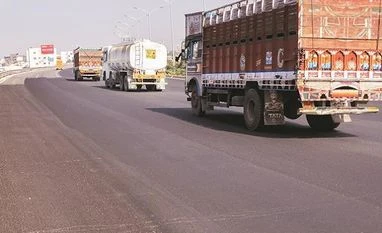Overdue replacement cycle to drive recovery in commercial vehicles: VECV
Overdue replacement cycle of commercial vehicles will drive recovery in the market, while demand for trucks is expected to start coming back from October-November onwards
)
Overdue replacement cycle of commercial vehicles will drive recovery in the market, while demand for trucks is expected to start coming back from October-November onwards, according to a top official of VE Commercial Vehicles (VECV).
Despite the challenging market situation currently, the company, a joint venture between the Volvo Group and Eicher Motors Ltd, expects that truck makers may find it difficult to supply when demand starts coming back, especially when large fleet operators opt for efficiency and productivity to drive down operating costs.
"Even though the current market situation is very very tough, I am very optimistic because of a few reasons," VECV Managing Director and CEO Vinod Aggarwal told PTI.
In the commercial vehicle (CV) market, trucks are replaced by big fleet operators in five to six years, but the CV market dropped by 40 per cent in 2019-20, and "this year the first four months have been almost a wash out and the market has dropped by almost 85-90 per cent", he said.
"It means the replacement cycle which normally should have gone through last year has not happened. Similarly, this year the replacement has not yet happened. It does not mean that replacement is not required," Aggarwal said.
Also Read
Two years ago, the government increased axle loads following which customers started loading their trucks with revised loads, even though those trucks were not designed to carry those extra loads, he added.
"All those redesign has happened this April 1, when BS-VI migration happened," he said, adding that VECV has ensured that all its new trucks are designed to carry the extra load.
"Therefore if you drive for the best productivity, it means you will have to go in for replacement of the old trucks where you were carrying the extra loads with trucks which are not designed to carry those loads. It means you need more replacement," Aggarwal added.
The normal replacement cycle has not gone through and secondly, replacements have to happen because of the axle load norms, he said.
"So there will be huge replacement demand which will get generated due to past pent up, axle load related and current replacement (requirements).
"So you will see demand coming back very fast and when that happens, I think there will be difficulty in supplying the trucks," Aggarwal asserted, adding that the normal replacement cycle is expected to start by September.
He further said, "Truck demand will start getting better with the start of the festive season from October-November onwards. Economy will recover in six to eight months and infrastructure investments will also start happening and based on that you will see better CV demand."
When asked if the current situation of the economy won't hurt demand, he said, "Of course the current situation is very challenging, but at the same time whatever goes down that goes up, that's the natural principle. The situation is not going to stay like this."
Though the economy is not in the best shape currently, things will come back to normal in six to eight months, he said.
"It will bounce back. Once this pandemic is over economic activity will start coming back, more and more 'unlock' is happening. People will start leading normal lives and there will be better treatment (of COVID-19) available and after sometime vaccines will also be available. So things will come back to normal, maybe in the next six to eight months," Aggarwal said.
He said people are already learning to live with this situation and things will improve as confidence comes back in the economy.
India has tremendous potential for growth and if infrastructure investments happen, then consumption will go up, which in turn will entail requirement of more trucks for transportation of goods.
Besides, he said logistics cost is still very high in India.
"If you have to drive down the logistics cost and increase efficiency and productivity, there will be more and more migration towards better productivity trucks," he added.
(Only the headline and picture of this report may have been reworked by the Business Standard staff; the rest of the content is auto-generated from a syndicated feed.)
More From This Section
Don't miss the most important news and views of the day. Get them on our Telegram channel
First Published: Aug 30 2020 | 2:28 PM IST
